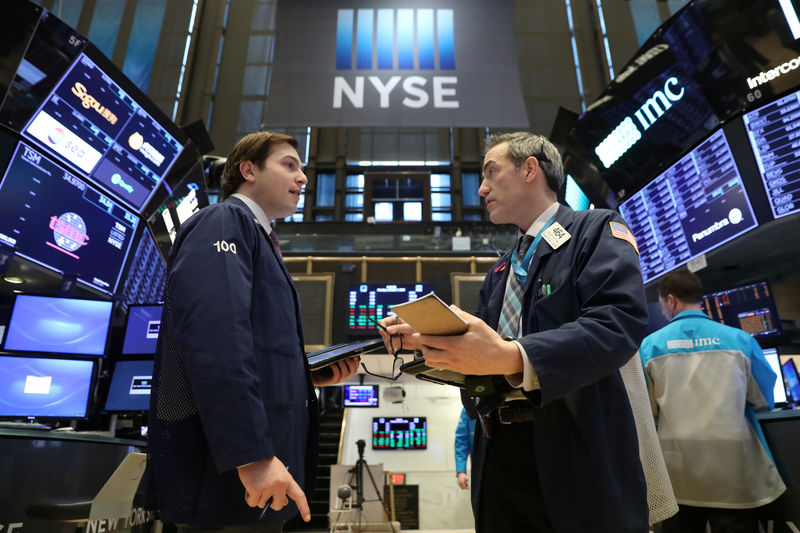By Lewis Krauskopf
NEW YORK (Reuters) - One of the rare market bright spots last year, the U.S. healthcare sector remains a Wall Street darling despite a slow start to 2019.
As 2019 begins, healthcare (SPXHC) is the most favored of the 11 main S&P 500 sectors, according to a Reuters review of ratings from 13 large Wall Street research firms, which recommend how to weigh those groups in investment portfolios.
Healthcare shares overall rose 4.7 percent last year, one of only two S&P 500 sectors, along with utilities, to post positive returns in 2018 as the benchmark index fell 6.2 percent.
Proponents cite the healthcare sector's reasonable valuations, strong balance sheets and dividend payments among many companies, as well as the group's upbeat outlook for earnings, which are less susceptible to economic cycles than other businesses.
If economic growth is slowing, some investors are wary of being too invested in cyclical sectors that thrive during an upswing, but do not want to be too defensive either.
“We are trying to find things that skirt both of those two categorizations, and healthcare is a really nice diversified earnings stream,” said Noah Weisberger, managing director for U.S. portfolio strategy at Bernstein.
Such diversity stems from the variety of companies comprising the sector: manufacturers of prescription medicines, makers of medical devices, such as heart valves and knee replacements, health insurers, hospitals and providers of tools for scientific research.
From a stock perspective, that means the sector includes potential fast-growing stocks, such as biotechs that can carry more risk and more reward, or large pharmaceutical companies and others that offer steadier, slower growth.
Investment advisory firm Alan B. Lancz & Associates sold some pharmaceutical holdings late last year that had posted big gains, such as Merck & Co (N:MRK), to move into biotech stocks it believed were undervalued, said Alan Lancz, the firm's president.
“We have maintained our overweighting, which is unusual for us with a sector that has outperformed so dramatically," Lancz said. "But mainly there are segments within the sector that still offer opportunity."
(GRAPHIC: Healthcare is most favored sector on Wall Street - https://tmsnrt.rs/2HaLYKT)
For 2019, healthcare companies in the S&P 500 are expected to increase earnings by 7.5 percent, ahead of the 6.3 percent growth estimated for S&P 500 companies overall, according to IBES data from Refinitiv.
Health insurer UnitedHealth Group Inc (N:UNH), the sector's third-largest company by market value, kicks off fourth-quarter earnings season for healthcare on Tuesday.
“Healthcare is one of the few sectors with high quality, above-market growth and it’s relatively immune to the array of macro headwinds that we see out there,” said Martin Jarzebowski, sector head of healthcare for Federated Investors.
Healthcare shares could also benefit from anticipation of increased dealmaking activity after two large acquisitions of biotechs were already announced this year.
Despite healthcare's outperformance last year, the sector is trading at the same valuation as the S&P 500 - 14.5 times earnings estimates for the next 12 months - whereas healthcare on average has held a premium over the market for the past 20 years, according to Refinitiv data.
The sector also is valued at a discount, by such price-to-earnings measures, to defensive sectors, including consumer staples (SPLRCS), which trades at 16.6 times forward earnings, and utilities (SPLRCU), which trades at 15.8 times.
(GRAPHIC: Healthcare stocks, by the numbers - https://tmsnrt.rs/2H7Mnxw)
According to the Reuters review of sector weightings, healthcare is followed by financials (SPSY), then technology (SPLRCT). Real estate <.SPLRCR> ranks as the most negatively rated group.
The healthcare sector has lagged in the early days of 2019, rising less than 1 percent against a 3 percent rise for the S&P 500.
Some investors doubt healthcare will maintain its outperformance. JP Morgan strategists downgraded the sector to "underweight" last month, pointing in part to political rhetoric possibly turning "more negative on healthcare leading up to the 2020 presidential elections."
The healthcare sector struggled ahead of the 2016 election, with the high U.S. cost of prescription medicines a prominent issue during the presidential campaign. With renewed scrutiny on drug pricing, such concerns linger.
The sector could suffer if investors become more optimistic about economic growth and flee defensive stocks, while the popularity of healthcare as an investment could work against it if the trade becomes overly crowded.

"There is risk there," said Walter Todd, chief investment officer at Greenwood Capital in South Carolina. But given issues affecting other sectors, he said, "when you look around the market...you arrive by default at healthcare, and so I think that’s why a lot of people are interested in the sector."